| Listing 1 - 6 of 6 |
Sort by
|
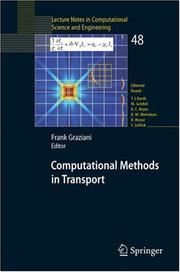
ISBN: 1280461446 9786610461448 3540281258 3540281223 Year: 2006 Publisher: Berlin, Heidelberg : Springer Berlin Heidelberg : Imprint: Springer,
Abstract | Keywords | Export | Availability | Bookmark
 Loading...
Loading...Choose an application
- Reference Manager
- EndNote
- RefWorks (Direct export to RefWorks)
There exist a wide range of applications where a significant fraction of the momentum and energy present in a physical problem is carried by the transport of particles. Depending on the specific application, the particles involved may be photons, neutrons, neutrinos, or charged particles. Regardless of which phenomena is being described, at the heart of each application is the fact that a Boltzmann like transport equation has to be solved. The complexity, and hence expense, involved in solving the transport problem can be understood by realizing that the general solution to the 3D Boltzmann transport equation is in fact really seven dimensional: 3 spatial coordinates, 2 angles, 1 time, and 1 for speed or energy. Low-order approximations to the transport equation are frequently used due in part to physical justification but many in cases, simply because a solution to the full transport problem is too computationally expensive. An example is the diffusion equation, which effectively drops the two angles in phase space by assuming that a linear representation in angle is adequate. Another approximation is the grey approximation, which drops the energy variable by averaging over it. If the grey approximation is applied to the diffusion equation, the expense of solving what amounts to the simplest possible description of transport is roughly equal to the cost of implicit computational fluid dynamics. It is clear therefore, that for those application areas needing some form of transport, fast, accurate and robust transport algorithms can lead to an increase in overall code performance and a decrease in time to solution.
Neutron transport theory --- Photon transport theory --- Radiative transfer --- Transport theory --- Research. --- Boltzmann transport equation --- Transport phenomena --- Mathematical physics --- Particles (Nuclear physics) --- Radiation --- Statistical mechanics --- Transfer, Radiative --- Astrophysics --- Geophysics --- Heat --- Multigroup diffusion (Neutron transport) --- Neutron diffusion theory --- Nuclear fission --- Nuclear fusion --- Nuclear reactors --- Radiation and absorption --- 517.95 --- 519.63 --- 681.3 *G18 --- 519.63 Numerical methods for solution of partial differential equations --- Numerical methods for solution of partial differential equations --- 517.95 Partial differential equations --- Partial differential equations --- 681.3 *G18 Partial differential equations: difference methods; elliptic equations; finite element methods; hyperbolic equations; method of lines; parabolic equations (Numerical analysis) --- Partial differential equations: difference methods; elliptic equations; finite element methods; hyperbolic equations; method of lines; parabolic equations (Numerical analysis) --- Research --- Computer science. --- Computational Science and Engineering. --- Theoretical, Mathematical and Computational Physics. --- Astrophysics and Astroparticles. --- Informatics --- Science --- Computer mathematics. --- Mathematical physics. --- Astrophysics. --- Astronomical physics --- Astronomy --- Cosmic physics --- Physics --- Physical mathematics --- Computer mathematics --- Electronic data processing --- Mathematics
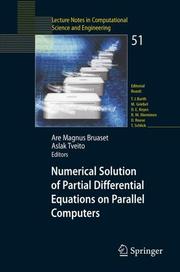
ISBN: 1280607920 9786610607921 3540316191 3540290761 Year: 2006 Publisher: Berlin, Heidelberg : Springer Berlin Heidelberg : Imprint: Springer,
Abstract | Keywords | Export | Availability | Bookmark
 Loading...
Loading...Choose an application
- Reference Manager
- EndNote
- RefWorks (Direct export to RefWorks)
Since the dawn of computing, the quest for a better understanding of Nature has been a driving force for technological development. Groundbreaking achievements by great scientists have paved the way from the abacus to the supercomputing power of today. When trying to replicate Nature in the computer’s silicon test tube, there is need for precise and computable process descriptions. The scienti?c ?elds of Ma- ematics and Physics provide a powerful vehicle for such descriptions in terms of Partial Differential Equations (PDEs). Formulated as such equations, physical laws can become subject to computational and analytical studies. In the computational setting, the equations can be discreti ed for ef?cient solution on a computer, leading to valuable tools for simulation of natural and man-made processes. Numerical so- tion of PDE-based mathematical models has been an important research topic over centuries, and will remain so for centuries to come. In the context of computer-based simulations, the quality of the computed results is directly connected to the model’s complexity and the number of data points used for the computations. Therefore, computational scientists tend to ?ll even the largest and most powerful computers they can get access to, either by increasing the si e of the data sets, or by introducing new model terms that make the simulations more realistic, or a combination of both. Today, many important simulation problems can not be solved by one single computer, but calls for parallel computing.
Differential equations, Partial --- Parallel processing (Electronic computers) --- Numerical solutions --- Data processing. --- 519.63 --- 681.3 *G18 --- Partial differential equations --- 681.3 *G18 Partial differential equations: difference methods; elliptic equations; finite element methods; hyperbolic equations; method of lines; parabolic equations (Numerical analysis) --- Partial differential equations: difference methods; elliptic equations; finite element methods; hyperbolic equations; method of lines; parabolic equations (Numerical analysis) --- 519.63 Numerical methods for solution of partial differential equations --- Numerical methods for solution of partial differential equations --- High performance computing --- Multiprocessors --- Parallel programming (Computer science) --- Supercomputers --- Numerical solutions&delete& --- Data processing --- Global analysis (Mathematics). --- Computer science. --- Computer science --- Differential equations, partial. --- Analysis. --- Computational Science and Engineering. --- Computational Mathematics and Numerical Analysis. --- Mathematics of Computing. --- Theoretical, Mathematical and Computational Physics. --- Partial Differential Equations. --- Mathematics. --- Computer mathematics --- Discrete mathematics --- Electronic data processing --- Informatics --- Science --- Analysis, Global (Mathematics) --- Differential topology --- Functions of complex variables --- Geometry, Algebraic --- Mathematics --- Mathematical analysis. --- Analysis (Mathematics). --- Computer mathematics. --- Computer science—Mathematics. --- Mathematical physics. --- Partial differential equations. --- 517.1 Mathematical analysis --- Mathematical analysis --- Physical mathematics --- Physics
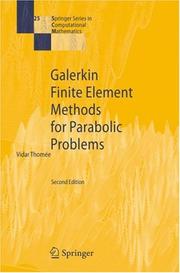
ISBN: 9783540331216 3540331212 3540632360 3642069673 9786610935710 1280935715 3540331220 3662033615 3662033593 Year: 2006 Volume: 25 Publisher: Berlin, Heidelberg : Springer Berlin Heidelberg : Imprint: Springer,
Abstract | Keywords | Export | Availability | Bookmark
 Loading...
Loading...Choose an application
- Reference Manager
- EndNote
- RefWorks (Direct export to RefWorks)
This book provides insight in the mathematics of Galerkin finite element method as applied to parabolic equations. The approach is based on first discretizing in the spatial variables by Galerkin's method, using piecewise polynomial trial functions, and then applying some single step or multistep time stepping method. The concern is stability and error analysis of approximate solutions in various norms, and under various regularity assumptions on the exact solution. The book gives an excellent insight in the present ideas and methods of analysis. The second edition has been influenced by recent progress in application of semigroup theory to stability and error analysis, particulatly in maximum-norm. Two new chapters have also been added, dealing with problems in polygonal, particularly noncovex, spatial domains, and with time discretization based on using Laplace transformation and quadrature.
519.63 --- 681.3 *G18 --- Differential equations, Parabolic --- -Finite element method --- 681.3 *G18 Partial differential equations: difference methods; elliptic equations; finite element methods; hyperbolic equations; method of lines; parabolic equations (Numerical analysis) --- Partial differential equations: difference methods; elliptic equations; finite element methods; hyperbolic equations; method of lines; parabolic equations (Numerical analysis) --- 519.63 Numerical methods for solution of partial differential equations --- Numerical methods for solution of partial differential equations --- FEA (Numerical analysis) --- FEM (Numerical analysis) --- Finite element analysis --- Numerical analysis --- Isogeometric analysis --- Parabolic differential equations --- Parabolic partial differential equations --- Differential equations, Partial --- Numerical solutions --- Finite element method --- 517 --- 519.6 --- 519.6 Computational mathematics. Numerical analysis. Computer programming --- Computational mathematics. Numerical analysis. Computer programming --- 517 Analysis --- Analysis --- Finite element method. --- Numerical solutions. --- Galerkin methods. --- Partial differential equations --- Equations différentielles paraboliques --- Méthode des éléments finis --- Solutions numériques --- Numerical analysis. --- Global analysis (Mathematics). --- Numerical Analysis. --- Analysis. --- Theoretical, Mathematical and Computational Physics. --- Analysis, Global (Mathematics) --- Differential topology --- Functions of complex variables --- Geometry, Algebraic --- Mathematical analysis --- Mathematical analysis. --- Analysis (Mathematics). --- Mathematical physics. --- Physical mathematics --- Physics --- 517.1 Mathematical analysis --- Mathematics
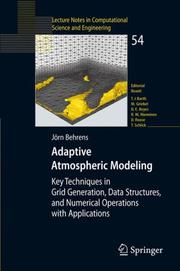
ISBN: 1280949341 9786610949342 3540333835 3540333827 Year: 2006 Volume: 52 Publisher: Berlin, Heidelberg : Springer Berlin Heidelberg : Imprint: Springer,
Abstract | Keywords | Export | Availability | Bookmark
 Loading...
Loading...Choose an application
- Reference Manager
- EndNote
- RefWorks (Direct export to RefWorks)
Gives an overview and guidance in the development of adaptive techniques for atmospheric modeling. This book covers paradigms of adaptive techniques, such as error estimation and adaptation criteria. Considering applications, it demonstrates several techniques for discretizing relevant conservation laws from atmospheric modeling.
Atmosphere --- Adaptive computing systems. --- Mathematical models. --- Adaptive computing --- Configurable computing systems --- Reconfigurable computing systems --- Computer systems --- Meteorology --- Atmospheric science --- Computer science. --- Physical geography. --- Computational Science and Engineering. --- Atmospheric Sciences. --- Geophysics/Geodesy. --- Geography --- Informatics --- Science --- Atmospheric models --- Atmospheric physics --- 51-7 --- 519.63 --- 681.3 *G18 --- 681.3*I61 --- 51-7 Mathematical studies and methods in other sciences. Scientific mathematics. Actuarial mathematics. Biometrics. Econometrics etc. --- Mathematical studies and methods in other sciences. Scientific mathematics. Actuarial mathematics. Biometrics. Econometrics etc. --- Models and modelmaking --- 681.3 *G18 Partial differential equations: difference methods; elliptic equations; finite element methods; hyperbolic equations; method of lines; parabolic equations (Numerical analysis) --- Partial differential equations: difference methods; elliptic equations; finite element methods; hyperbolic equations; method of lines; parabolic equations (Numerical analysis) --- 519.63 Numerical methods for solution of partial differential equations --- Numerical methods for solution of partial differential equations --- 681.3*I61 Simulation theory: model classification; continuous simulation; discrete simulation (Simulation and modeling) --- Simulation theory: model classification; continuous simulation; discrete simulation (Simulation and modeling) --- Mathematical models --- Models --- Computer mathematics. --- Atmospheric sciences. --- Geophysics. --- Geological physics --- Terrestrial physics --- Earth sciences --- Physics --- Atmospheric sciences --- Computer mathematics --- Electronic data processing --- Mathematics
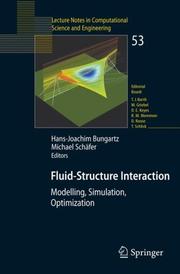
ISBN: 3540345965 9783540345954 1280935723 9786610935727 3540345957 Year: 2006 Publisher: Berlin, Heidelberg : Springer Berlin Heidelberg : Imprint: Springer,
Abstract | Keywords | Export | Availability | Bookmark
 Loading...
Loading...Choose an application
- Reference Manager
- EndNote
- RefWorks (Direct export to RefWorks)
Fluid-structure interactions (FSI), that is interactions of some movable or deformable structure with an internal or surrounding fluid flow, are among the most important and, with respect to both modelling and computational issues, the most challenging multi-physics problems. The variety of FSI occurrences is abundant and ranges from tent-roofs to micropumps, from parachutes via airbags to blood flow in arteries. This volume of LNCSE contains a collection of papers presented at the International Workshop on FSI held in October 2005 in Hohenwart and organized by DFG's Research Unit 493 "FSI: Modelling, Simulation, and Optimization". The papers address partitioned and monolithic coupling approaches, methodical issues and applications, and discuss FSI from the mathematical, informatical, and engineering point of view.
Fluid-structure interaction --- 51-74 --- 519.63 --- 681.3 *G18 --- 681.3*I61 --- Structure-fluid interaction --- Fluid dynamics --- Structural dynamics --- 681.3 *G18 Partial differential equations: difference methods; elliptic equations; finite element methods; hyperbolic equations; method of lines; parabolic equations (Numerical analysis) --- Partial differential equations: difference methods; elliptic equations; finite element methods; hyperbolic equations; method of lines; parabolic equations (Numerical analysis) --- 681.3*I61 Simulation theory: model classification; continuous simulation; discrete simulation (Simulation and modeling) --- Simulation theory: model classification; continuous simulation; discrete simulation (Simulation and modeling) --- 519.63 Numerical methods for solution of partial differential equations --- Numerical methods for solution of partial differential equations --- Mathematical models --- Mathematics in engineering science and technology --- Engineering. --- Construction --- Industrial arts --- Technology --- Hydraulic engineering. --- Computer science. --- Engineering mathematics. --- Cardiology. --- Engineering Fluid Dynamics. --- Computational Science and Engineering. --- Theoretical, Mathematical and Computational Physics. --- Mathematical and Computational Engineering. --- Heart --- Internal medicine --- Engineering --- Engineering analysis --- Mathematical analysis --- Informatics --- Science --- Engineering, Hydraulic --- Fluid mechanics --- Hydraulics --- Shore protection --- Diseases --- Mathematics --- Fluid mechanics. --- Computer mathematics. --- Mathematical physics. --- Applied mathematics. --- Physical mathematics --- Physics --- Computer mathematics --- Electronic data processing --- Hydromechanics --- Continuum mechanics
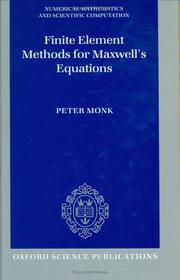
ISBN: 0198508883 9780198508885 Year: 2006 Publisher: Oxford Clarendon
Abstract | Keywords | Export | Availability | Bookmark
 Loading...
Loading...Choose an application
- Reference Manager
- EndNote
- RefWorks (Direct export to RefWorks)
Comprehensive treatment of edge finite element methods Variational theory of Maxwell's equations Error analysis of finite element methods Background material in functional analysis and Sobolev space theory Introduction to inverse problems Since the middle of the last century, computing power has increased sufficiently that the direct numerical approximation of Maxwell's equations is now an increasingly important tool in science and engineering. Parallel to the increasing use of numerical methods in computational electromagnetism there has also been considerable progress in the mathematical understanding of the properties of Maxwell's equations relevant to numerical analysis. The aim of this book is to provide an up to date and sound theoretical foundation for finite element methods in computational electromagnetism. The emphasis is on finite element methods for scattering problems that involve the solution of Maxwell's equations on infinite domains. Suitable variational formulations are developed and justified mathematically. An error analysis of edge finite element methods that are particularly well suited to Maxwell's equations is the main focus of the book. The methods are justified for Lipschitz polyhedral domains that can cause strong singularities in the solution. The book finishes with a short introduction to inverse problems in electromagnetism.
535.13 --- 535.13 Electromagnetic theory (Maxwell) --- Electromagnetic theory (Maxwell) --- finite element method --- computer-aided engineering --- CAE (computer aided engineering) --- Maxwell equations --- Electromagnétisme --- Equations de Maxwell --- Partitial differential equations: domain decomposition methods; elliptic equations; finite difference methods; finite element methods; finite volume methods; hyperbolic equations; inverse problems; iterative solution techniques; methods of lines; multigrid and multilevel methods; parabolic equations; special methods --- Maxwell equations. --- Electromagnétisme --- Electromagnetism --- Finite element method --- Electromagnetics --- Magnetic induction --- Magnetism --- Metamaterials --- Equations, Maxwell --- Differential equations, Partial --- Electromagnetic theory --- FEA (Numerical analysis) --- FEM (Numerical analysis) --- Finite element analysis --- Numerical analysis --- Isogeometric analysis --- Mathematical models --- 519.63 --- 681.3*G18 --- 519.63 Numerical methods for solution of partial differential equations --- Numerical methods for solution of partial differential equations --- Numerical solutions of differential equations --- Functional analysis --- eindige elementen --- Finite element method. --- Mathematical models. --- Méthode des éléments finis --- Modèles mathématiques --- Electromagnetism - Mathematical models --- Equations aux derivees partielles --- Equations de maxwell --- Methodes numeriques --- Elements finis
| Listing 1 - 6 of 6 |
Sort by
|

 Search
Search Feedback
Feedback About
About Help
Help News
News